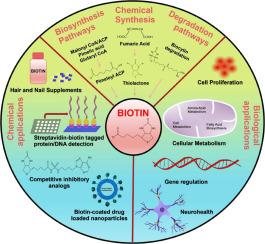Biotin: DNA to diet
IF 4.9
2区 医学
Q1 BIOCHEMISTRY & MOLECULAR BIOLOGY
引用次数: 0
Abstract
Biotin, also known as vitamin B7 or vitamin H, is a water-soluble vitamin that acts as an essential cofactor in many cellular metabolic processes, including fatty acid biosynthesis, fatty acid oxidation, amino acid metabolism, and gluconeogenesis. Biotin is not synthesized by human cells; they take it up from intestinal gut bacteria or dietary sources. The estimated average requirement (EAR) for biotin is uncertain, but people of different ages require biotin between 5 and 35 mcg/d. Interestingly, the chemical structure and involvement of biotin in metabolic pathways in all three domains of life have opened the possibilities of drug development against pathogenic bacteria. Moreover, biotin is a small molecule with high and robust affinity towards avidin, which makes it suitable for use as a biochemical sensor for the diagnosis of diseases. A substantial adsorption and affinity of biotin towards proteins implicated in lipid or fatty-acid synthesis directs its potential to interact with and dismantle the extracellular matrix (ECM) of bacterial biofilm. This review explores the genesis, structural outlook, and multifaceted role of biotin in genetics, healthcare, diet, and future research. This aims to provide a holistic view of biotin research, ranging from cellular and molecular levels to the dosage and food supplements.

生物素:DNA到饮食。
生物素,也被称为维生素B7或维生素H,是一种水溶性维生素,在许多细胞代谢过程中起重要的辅助因子作用,包括脂肪酸生物合成、脂肪酸氧化、氨基酸代谢和糖异生。生物素不是由人体细胞合成的;它们从肠道细菌或饮食中摄取。生物素的估计平均需求量(EAR)是不确定的,但不同年龄的人需要5-35微克/天的生物素。有趣的是,生物素的化学结构和在生命所有三个领域的代谢途径中的参与为开发抗致病菌的药物提供了可能性。此外,生物素是一种小分子,对亲和素具有高而强大的亲和力,这使得它适合用作疾病诊断的生化传感器。生物素对涉及脂质或脂肪酸合成的蛋白质的大量吸附和亲和力指导其与细菌生物膜的细胞外基质(ECM)相互作用和拆除的潜力。本文综述了生物素的起源、结构前景及其在遗传学、医疗保健、饮食和未来研究中的多方面作用。这旨在提供生物素研究的整体观点,从细胞和分子水平到剂量和食物补充剂。
本文章由计算机程序翻译,如有差异,请以英文原文为准。
求助全文
约1分钟内获得全文
求助全文
来源期刊

Journal of Nutritional Biochemistry
医学-生化与分子生物学
CiteScore
9.50
自引率
3.60%
发文量
237
审稿时长
68 days
期刊介绍:
Devoted to advancements in nutritional sciences, The Journal of Nutritional Biochemistry presents experimental nutrition research as it relates to: biochemistry, molecular biology, toxicology, or physiology.
Rigorous reviews by an international editorial board of distinguished scientists ensure publication of the most current and key research being conducted in nutrition at the cellular, animal and human level. In addition to its monthly features of critical reviews and research articles, The Journal of Nutritional Biochemistry also periodically publishes emerging issues, experimental methods, and other types of articles.
 求助内容:
求助内容: 应助结果提醒方式:
应助结果提醒方式:


